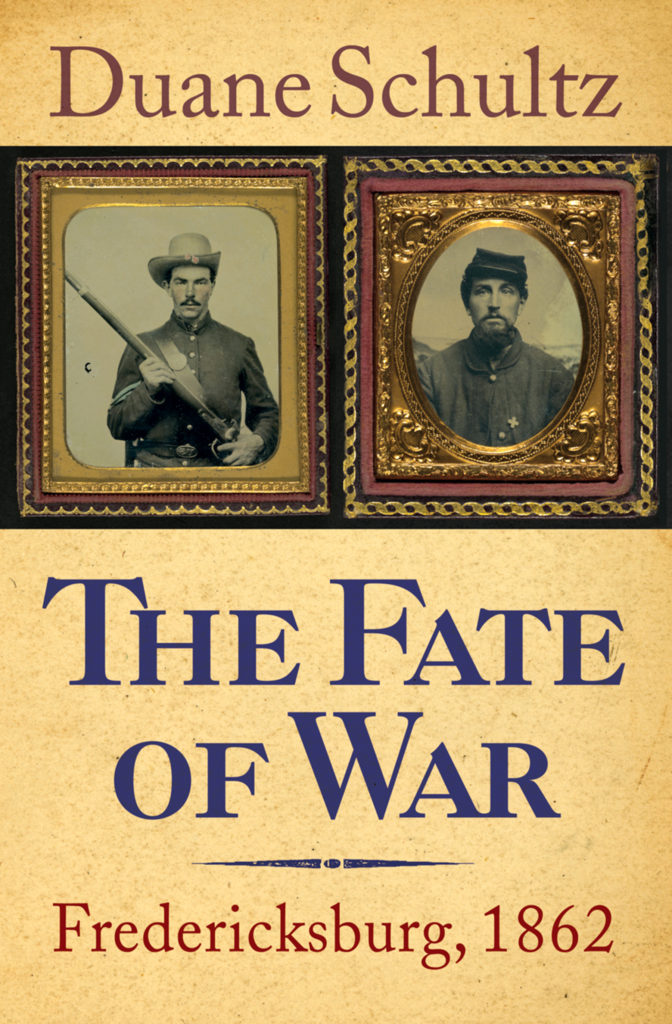

The Fate of War
Fredericksburg, 1862
Select Your Format:
Hardback$28.00eBook
$28.00 Add to Cart Save 25% on every book by joining our Book Club


Select Your Format:
HardbackThe Union assault on the critical Confederate stronghold of Fredericksburg, Virginia, along the Rappahannock River in December 1862 was one of the most significant and storied battles of the Civil War. It was fought in order to secure confidence in the North for Lincoln’s administration after 18 months of Confederate victories, Union setbacks, and directionless Northern leadership. The result was a complete and stunning Confederate victory and one of the bloodiest losses for the Union Army. Federal General Ambrose E. Burnside and his Army of the Potomac planned to overrun Fredericksburg and move on to Richmond, the Confederate capital. The opposing general, Robert E. Lee, and his Army of Northern Virginia prepared Fredericksburg’s defense. Thousands of Union troops were able to successfully cross the Rappahannock River despite withering small arms fire and proceeded to brutally sack the city, terrorizing its remaining civilian inhabitants while the Confederates fell back to a line of heights to the west. Burnside soon ordered his generals to attack with the intention of flanking the Confederate defenders. Unable to dislodge or go around the enemy, Burnside was forced to withdraw without a victory after suffering appalling casualties.
In The Fate of War: Fredericksburg, 1862, historian and professional psychologist Duane Schultz uses this key moment in Civil War history to address how soldiers and civilians react to the stress of war. Rather than a traditional military history—and there are a number of excellent accounts of troop movements and strategy at Fredericksburg—The Fate of War explores the human element in battle; the motivations, passions, and emotions of the people who fought on both sides. Using letters, diaries, and memoirs, including those of Clara Barton and Walt Whitman, Schultz reveals what individuals can force themselves to do in the name of duty, patriotism, and dedication to a cause, or the ultimate fear of letting down their friends. Schultz’s account, grounded in careful research, is a record of the triumph and failure, courage and cowardice, compassion and cruelty of the people—the ordinary and high-ranking, soldier and civilian, men and women—who came together one terrible day.

Duane Shultz is author of many books of history, including Crossing the Rapido: A Tragedy of World War II, Into the Fire: Ploesti, The Most Fateful Mission of World War II, Evans Carlson, Marine Raider: The Man Who Commanded America’s First Special Forces, and Coming Through Fire: George Armstrong Custer and Chief Black Kettle.
“The Battle of Fredericksburg [December 1863] is often reduced to the gallantry of the Federal assaults on the stonewall at the foot of Marye’s Heights. Recently through, the work of scholars have provided a more detailed research on both the entire battlefield and the city of Fredericksburg. Duane Schultz’s The Fate of War: Fredericksburg 1862 provides an entry point to other stories of the battlefield and the town. Schultz offers human interest stories to propel his account forward. Succinct biographies are used throughout to establish the background to the battle and to propel the story through the winter of 1863. The motivations, passions, and emotions of the soldiers and civilians are revealed through their letters, diaries, and memoirs. Bibliographic notes are not numbered but organized by chapters and pages. Westholme Publishing often takes care with its books’ spines and binding. The Fate of War is no exception. The book is comfortable to hold and the pages fall open easily. The Fate of War is accessible to high school students and readers in general.”—Civil War Librarian